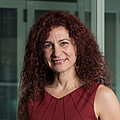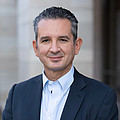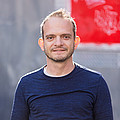Εξωτερική Συμβουλευτική Επιτροπή
Εξωτερική Συμβουλευτική Επιτροπή της Σχολής ΗΜΜΥ
(όπως εγκρίθηκε από την 9η/09.03.2022 Συνέλευση του Τμήματος ΗΜΜΥ)
Prof. Anastasia Ailamaki
Computer Science
Presently: EPFL & RAW Labs SA
https://people.epfl.ch/anastasia.ailamaki/
Anastasia Ailamaki is a Professor of Computer and Communication Sciences at the École Polytechnique Fédérale de Lausanne (EPFL) in Switzerland, as well as the co-founder and Chair of the Board of Directors of RAW Labs SA, a Swiss company developing systems to analyze heterogeneous big data from multiple sources efficiently. She earned a Ph.D. in Computer Science from the University of Wisconsin-Madison in 2000. She has received the 2019 ACM SIGMOD Edgar F. Codd Innovations Award and the 2020 VLDB Women in Database Research Award. She is also the recipient of an ERC Consolidator Award (2013), the Finmeccanica endowed chair from the Computer Science Department at Carnegie Mellon (2007), a European Young Investigator Award from the European Science Foundation (2007), an Alfred P. Sloan Research Fellowship (2005), an NSF CAREER award (2002), twelve best-paper awards in international scientific conferences. She has received the 2018 Nemitsas Prize in Computer Science by the President of Cyprus and the 2021 ARGO Innovation Award by the President of the Hellenic Republic. She is an ACM fellow, an IEEE fellow, a member of the Academia Europaea, and an elected member of the Swiss, the Belgian, the Greek, and the Cypriot National Research Councils.
Prof. Dionysios Aliprantis
Power and Energy Systems
Presently: Purdue University
https://engineering.purdue.edu/~dionysis/
Dionysios Aliprantis received the Diploma degree in electrical and computer engineering from the National Technical University of Athens, Greece, in 1999, and the Ph.D. degree from Purdue University, West Lafayette, IN, USA, in 2003. He is currently a Professor of Electrical and Computer Engineering at Purdue University. His research interests are related to electromechanical energy conversion and the analysis of power systems. More recently, his work has focused on technologies that enable the integration of renewable energy sources in the electric power system, and the electrification of transportation. Prof. Aliprantis was a recipient of the NSF CAREER award in 2009. He serves as an Associate Editor for the IEEE Transactions on Energy Conversion.

Dr. Nicholas Buris
Antennas & Propagation
Presently: Amazon
https://www.ieeeaps.org/index.php?option=com_content&view=article&id=372
Nick Buris received the diploma of Electrical Engineering in 1982 from the National Technical University of Athens, Greece and the Ph.D. in EE from the North Carolina State University in 1986. In 1986, he was a visiting professor at NCSU working on space reflector antennas for NASA. In 1987 he joined the faculty of the ECE dept. at UMass, Amherst. His research work there focused on microwave magnetics, broadband phased arrays and tunable arrays printed on ferrite substrates. In 1990 he was a summer faculty fellow at the NASA Langley Research Center working on an ionization (plasma) sensor for an experimental reentry spacecraft. From 1992 to 2009 he held various leadership positions at Motorola Labs. He has worked and managed large projects on antenna product design, RF propagation measurements, RFID’s, mm wave systems and the development of proprietary software tools for electromagnetics, wireless system design and multidisciplinary optimization. In 2009 he founded NEBENS, a consulting company focusing on cross layer design aspects (antenna, coverage and algorithms) of Smart Antenna based wireless systems as well as spectrum management and coexistence algorithms for Software and Cognitive Radio systems. NEBENS recently developed and commercialized MIMObit, a software tool based on its core competence. In 2017, Nick became a professor at Shanghai University building a research program on various aspects of advanced wireless communication systems. In 2020 Nick started work with Amazon where his projects include target recognition with mmWave MIMO radar, antenna design at the system level, wireless sustainability, etc. Nick is an IEEE fellow and has served the IEEE, CTIA and the TIA by participating in and/or chairing various of their technical program and standards committees.
Prof. Christos Cassandras
Systems Engineering
Presently: Boston University
https://www.bu.edu/eng/profile/christos-cassandras/
Christos G. Cassandras is Distinguished Professor of Engineering at Boston University. He is Head of the Division of Systems Engineering, Professor of Electrical and Computer Engineering, and co-founder of Boston University’s Center for Information and Systems Engineering (CISE). He received a B.S. degree from Yale University, M.S.E.E from Stanford University, and S.M. and Ph.D. degrees from Harvard University. In 1982-84 he was with ITP Boston, Inc. where he worked on the design of automated manufacturing systems. In 1984-1996 he was a faculty member at the Department of Electrical and Computer Engineering, University of Massachusetts/Amherst. He specializes in the areas of discrete event and hybrid systems, cooperative control, stochastic optimization, and computer simulation, with applications to computer and sensor networks, manufacturing systems, and transportation systems. He has published over 450 refereed papers in these areas, and six books. He has guest-edited several technical journal issues and serves on several journal Editorial Boards. In addition to his academic activities, he has worked extensively with industrial organizations on various systems integration projects and the development of decision-support software. He has most recently collaborated with MathWorks, Inc. in the development of the discrete event and hybrid system simulator SimEvents.
Dr. Cassandras was Editor-in-Chief of the IEEE Transactions on Automatic Control from 1998 through 2009 and has also served as Editor for Technical Notes and Correspondence and Associate Editor. He is currently an Editor of Automatica. He was the 2012 President of the IEEE Control Systems Society (CSS). He has also served as Vice President for Publications and on the Board of Governors of the CSS, as well as on several IEEE committees, and has chaired several conferences. He has been a plenary/keynote speaker at numerous international conferences, including the American Control Conference in 2001, the IEEE Conference on Decision and Control in 2002 and 2016, and the 20th IFAC World Congress in 2017 and has also been an IEEE Distinguished Lecturer.
He is the recipient of several awards, including the 2011 IEEE Control Systems Technology Award, the Distinguished Member Award of the IEEE Control Systems Society (2006), the 1999 Harold Chestnut Prize (IFAC Best Control Engineering Textbook) for Discrete Event Systems: Modeling and Performance Analysis, a 2011 prize and a 2014 prize for the IBM/IEEE Smarter Planet Challenge competition (for a “Smart Parking” system and for the analytical engine of the Street Bump system respectively), the 2014 Engineering Distinguished Scholar Award at Boston University, several honorary professorships, a 1991 Lilly Fellowship and a 2012 Kern Fellowship. He is a member of Phi Beta Kappa and Tau Beta Pi. He is also a Fellow of the IEEE and a Fellow of the IFAC and holds a Chair Professorship at the Department of Automation, Tsinghua University.
Dr. Georgios Dimou
FPGA, Hardware Architecture
Presently: Niobium Microsystems, Inc.
https://www.linkedin.com/in/georgios-dimou-77a6b43/
Georgios D. Dimou is the co-founder and CTO of Niobium Microsystems, a fabless semiconductor spinout of Galois Inc., specializing in secure, low-power, custom System-on-Chip (SoC) designs and currently working on research projects with several US agencies (e.g DARPA, SDA, AFRL, NASA). He has 20+ years of experience in hardware design with expertise spanning from architecture to low-level circuit implementation. On the architecture side, his research interests include the fields of digital signal processing, and more recently AI and Neuromorphic computing. On the implementation side, he has led several commercial and research projects with particular emphasis on asynchronous circuit design and low-power design techniques.
Previously, Georgios was part of Reduced Energy Microsystems where he worked on low-power machine vision. Prior to that, he was part of Intel, initially as part of the Datacenter group and later at Intel Labs. His most notable work at Intel Labs includes Intel’s Loihi neuromorphic processor architecture and implementation. Earlier Georgios spent time doing research on asynchronous circuits and EDA tools, which included co-founding TimeLess Design Automation in order to bring the technology to market. TimeLess design automation was acquired in 2010 by Fulcrum and later Intel in 2011. Before that he spent 8 years in the field of telecommunications at TrellisWare Technologies, creating custom industry-leading hardware implementations for advanced Forward Error Correcting codes and digital signal processing for both commercial and defense applications.
Dr. Dimou holds a BS in Electronic and Computer Engineering from the Technical University of Crete in Greece (1999), and MS and Ph.D. degrees in Electrical and Computer Engineering from the University of Southern California, USA (2001 & 2009 respectively).







